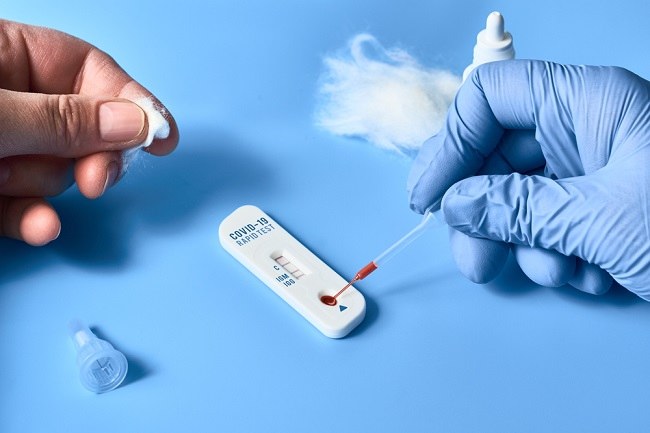Infliximab is a drug for mentreat rheumatoid arthritis, ankylosing spondylitis, psoriatic arthritis, plaque psoriasis, Crohn's disease, or ulcerative colitis. Infliximab is usually used when other treatments are not working.
Infliximab is a monoclonal antibody that works by blocking the body's natural chemical called tumor necrosis factor alpha (TNF-α). That way, the immune system response will decrease and inflammation will subside. This drug should not be used carelessly and must be according to a doctor's prescription.

infliximab trademarks: Remicade, Remsima
What is Infliximab
| group | Prescription drugs |
| Category | Tumor necrosis factor alpha inhibitor (TNF-alpha inhibitor) |
| Benefit | Relieves inflammation due to rheumatoid arthritis, ankylosing spondylitis, psoriatic arthritis, plaque psoriasis, Crohn's disease or ulcerative colitis. |
| Used by | Adults and children 6 years old |
| Infliximab for pregnant and lactating women | Category C: Animal studies have shown adverse effects on the fetus, but there are no controlled studies in pregnant women. Drugs should only be used if the expected benefit outweighs the risk to the fetus. Infliximab can be absorbed into breast milk. If you are breastfeeding, do not use this medicine without consulting your doctor first. |
| Drug form | Injection powder |
Precautions Before Using Infliximab
Infliximab can only be given by a doctor in a hospital. There are several things to consider before using this drug, including:
- Tell your doctor about any allergies you have. Infliximab should not be given to patients who are allergic to this drug.
- Tell your doctor if you have or have had COPD, diabetes, heart disease, heart failure, thrombocytopenia, leukopenia, multiple sclerosis, seizures, Guillain Barre syndrome, chronic obstructive pulmonary disease, cancer, liver disease, or an infectious disease, such as tuberculosis, hepatitis B, or herpes.
- Tell your doctor if you are having phototherapy to treat psoriasis or plan to get vaccinated.
- Tell your doctor if you are taking certain medications, supplements, or herbal products.
- Tell your doctor if you are pregnant, breastfeeding, or planning a pregnancy.
- Tell your doctor if you are taking infliximab before having any surgical procedure, including dental surgery.
- Avoid direct contact with someone who is suffering from an infectious disease that is easily transmitted, because this drug can increase your risk of infection.
- See your doctor right away if you have an allergic reaction to this medicine, a serious side effect, or an overdose after using this medicine.
Dosage and Instructions for Use Infliximab
The dose given by the doctor can be different, depending on the condition and the patient's response to the drug. The following are general doses of infliximab for adults and children based on the condition to be treated:
Condition: Rheumatoid arthritis
- Mature: 3 mg/kg by infusion. The dose can be repeated 2 weeks and 6 weeks after the first dose. The maintenance dose is given every 8 weeks. Infliximab will be given in combination with methotrexate.
Condition: Psoriasis arthritis or plaque psoriasis
- Mature: 5 mg/kg by infusion. The dose can be repeated 2 weeks and 6 weeks after the first dose. The maintenance dose is given every 8 weeks.
Condition: Crohn's disease or ulcerative colitis
- Adults and children 6 years of age: 5 mg/kg by infusion. The dose will be given again at 2 and 6 weeks after the first infusion, then every 8 weeks.
Condition: Ankylosing spondylitis
- Mature: 5 mg/kg by infusion. The dose will be given again at 2 and 6 weeks after the first infusion, then every 6-8 weeks.
How to Use Infliximab Correctly
Doctors or medical personnel at the hospital will give infliximab by infusion into a vein (intravenous / IV) for at least 2 hours. If needed, the doctor can increase the dose of the drug or stop the medication.
During the administration of infliximab and some time afterward, the doctor will monitor the patient's condition to ensure that there are no serious side effects due to infliximab.
During treatment with infliximab, follow the doctor's recommendations for more effective treatment. You may need to undergo medical examinations, such as regular urine and blood tests to make sure there are no side effects or complications from taking this drug.
Infliximab Interactions with Other Drugs
The following are some of the effects of interactions that may occur when taking infliximab with certain drugs:
- Increased risk of severe infection and lack of white blood cells (neutrophils)neutropenia) if used with anakinra or abatacept
- Increased risk of side effects and infection when used with live vaccines, such as the BCG vaccine
Infliximab Side Effects and Dangers
Some of the side effects that can occur after using infliximab are:
- Headache
- Stomach ache
- Nauseous
Tell your doctor if the above side effects do not subside or get worse. Tell your doctor right away if you have an allergic drug reaction or serious side effects, such as:
- Muscle or joint pain
- Confusion
- Easy bruising
- Muscles in the hands or feet feel weak, tingling, or numb
- A butterfly-shaped rash appears on the face
- Pain, redness, or swelling in the hands or feet
- Seizures
- Symptoms of heart failure, such as shortness of breath, swelling of the feet or ankles, weakness, or drastic weight gain
- Symptoms of infection, such as cough, sore throat, fever, chills, difficulty breathing, frequent urination, pain when urinating, mouth sores, or abnormal vaginal discharge
- Symptoms of liver disease, such as unusual tiredness, persistent nausea or vomiting, loss of appetite, stomach pain, jaundice, or dark urine









